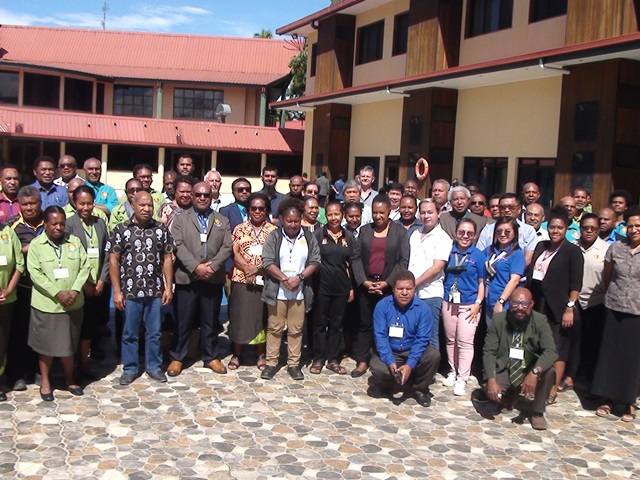By CYRIL GARE – Freelance Journalist
PAPUA New Guinea will for the first time since decolonization have its own biosecurity law which will safeguard the country’s agricultural and natural resources, boost trade and protect public health.
Most biosecurity laws in use today are obsolete and outdated since 1952 or beyond.
PNG’s effort followed years of consultation and drafting process since 2016 spearheaded by the country’s biosecurity watchdog – National Agriculture Quarantine and Inspection Authority (NAQIA) with technical assistance of International Finance Corporation (IFC) – a member of the World Bank Group, with the support of the Australian and New Zealand governments.
Last week (July 11-14) a final consultation conference was staged in Lae, Morobe province that finalized the legislative regulatory framework of the long-waited new Biosecurity Bill 2023.
More than 100 participants from various government departments and state agencies headed by lawyers from State Solicitor and First Legislative Counsel (FLC) as well as reps from the private sector, international agencies and donor governments attended.
State Solicitors and the First Legislative Counsel are putting final touches before the Goroka MP and Agriculture Minister, Aiye Tambua brings it to Parliament for enactment by year ends.
BACKGROUND
During a Pacific Islands Forum (PIF) leaders meeting in 2002 the leaders had discussed the need for a regional trade bloc and biosecurity was a concern. As a result other countries in the region including Fiji, Solomon Islands and Vanuatu have developed their respective biosecurity legislations except PNG.
Since taking office on May 30, 2019, the second term Prime Minister, James Marape and his governments had successfully passed more legislations than any of his predecessors. Now in his fourth year as Prime Minister, James Marape has pieced together key initiatives that would drive the development agenda of PNG. In fact, his Government has passed in parliament 150 amendments and legislations aim at resuscitating and sustaining the economy. This anticipated Biosecurity Act will add to the tally.
From national security to biosecurity, rest assured that the Marape-Rosso Government has you covered.
NATIONAL SECURITY VS BIOSECURITY
National security involves the safety of a nation against threats such as terrorism, war, or espionage.
Biosecurity on the other hand also involves safety of a nation but usually that refers to measures aimed at preventing the introduction and or spread of harmful organisms to animals and plants in order to minimize the risk of transmission of infectious disease.
Biosecurity is also very important for international trade and economic prosperity of a nation.
Because man depends on animals and plants for food, biosecurity requires national coherence for survival as a nation. Without food, a population starves and perishes.
BIOSECURITY WATCHDOG
The business of biosecurity in PNG lies primarily and is a mandated function of NAQIA by law.
Its core functions are but not limited to:
*Minimizing the risk of introduction, establishment and spread of pests and diseases affecting animals and plants and including those that may consequentially harm humans, agriculture, biodiversity, natural ecosystems and the economy;
*Ensure that imports pose minimum risks from introducing pests and diseases that is of biosecurity significance;
*Provide assurance certification on each consignment of exported products including PNG’s export commodities that are of animal and or plant origin that must conform to World Trade Organization (WTO) Sanitary and Phytosanitary (SPS) measures and also meeting biosecurity protocols of these importing countries to access their markets.
A proud NAQIA managing director, Mr. Joel Alu described the occasion as an “excited historical moment for PNG” adding that biosecurity of plants and animals are fundamental pillars of agriculture and international trade and it was agriculture in renewable resources like forestry, fisheries and tourism that will “deliver the future of PNG” not “oil and gas”.
“The Prime Minister has allocated four ministries to the agriculture sector with good intentions. He wants coffee to deliver, he wants livestock to deliver, and oil palm to deliver.
“And by 2050, the Prime Minister wants to see PNG economy reach a K200 billion mark. It is now up to us public servants and politicians to make it work and deliver to the people.
“In the formative days, our fathers who were serious and dedicated building blockers of our country had “delivered”. And we, if not us, who?” Mr. Alu said.
BIOSECURITY BILL 2023
The anticipated Biosecurity Bill 2023 comes in 12 parts:
1) Preliminary,
2) Biosecurity Measures,
3) Biosecurity at the Border,
4) Imports,
5) Transit,
6) Export and Re-Export,
7) Quarantine,
8) Internal Biosecurity,
9) Biosecurity during Agricultural production,
10) Biosecurity Authority of PNG,
11) Enforcement, and
12) Miscellaneous Provisions.
The goals of the Biosecurity Bill 2023 are to: Establish legally enforceable mechanisms and principles to prevent the risk of introduction and spread of pests and diseases and protect the health of humans, animals and plants and natural resources generally; Enable the country to meet its legal commitments under international agreements and harmonize its biosecurity measures with international standards and best practices; Implement domestic policy; Define an institutional framework for implementation and enforcement; and Create a robust and transparent environment for trade, investment and business as well as agricultural activities.
The Biosecurity Bill 2023 has streamlined an all new robust framework by: Repealing the “Technical Provisions” of the National Agriculture Quarantine and Inspection Act 1997; Repealing the “Biosecurity/Agriculture Related Provisions” of the Quarantine Act 1953 (Ch.234); Repealing the Slaughtering Act 1964 as amended; and Repealing in their entirety: the Animal Disease Control Act 1952 (Ch.206), Plant Pest and Disease & Control Act 1953 (Ch. 220), Animals Act 1952 (Ch. 329), and respect regulations.
CURRENT BIOSECURITY THREATS
At the door step are the Foot and Mouth Disease (FMD), Rabies (zoonosis), Highly Pathogenic Avian Influenza (HPAI-zoonosis), Newcastle Disease (ND), and the Lumpy Skin Disease are few of the world’s most dangerous animal diseases.
These “very infectious” animal diseases are at neighboring Indonesia and could cross over to PNG anytime.
In the event of incursion, the impact would be devastating on health of our animal population and consequently impacting humans.
When this happens, our national food security will be destabilized and emergency interventions would be the available option for national coherence.
In 2019, the World Organization for Animal Health WOAH) or also (OIE) listed 117 animal diseases, infections and infestations across the globe. There are many others but not listed yet which are potently able to annihilate economies and people’s livelihoods on the planet.
Biosecurity therefore is as important as national security of a nation. Without security on all fronts, a nation is vulnerable and would perish.
More so, biosecurity involves international trade. Because Papua New Guinea is a member of the United Nation’s World Trade Organization (WTO) our imports and exports must meet WTO standards. Without biosecurity, our exports of agricultural products could be rejected and the economy suffers.
PESTS AND DISEASES ALREADY IN PNG
Coffee Berry Borer: From Banz in Jiwaka province, the Coffee Berry Borer (CBB) pest has spread to other parts of the country including Simbu, Eastern Highlands, Madang and Morobe despite joint quarantine and containment efforts by NAQIA and the CIC. Coffee is a K500 million earner for PNG.
Cocoa Pod Borer or CPB: Hit PNG in March, 2006 at the heart of the Cocoa land, Kerevat, East New Britain before spreading to mainland in West Sepik. Production dropped below 27,000 metric tonnes. Major collaboration and intervention program has brought back production to around 37,000 tonnes as at December, 2022 valued at K308 million. PNG Cocoa Board is aiming to increase its activities by 10% annually from 2023 to meet a target of 100,000 tonne by 2027.
Fall Army Worm (FAW): A devastating insect pest of corn is present and spreading in the country. NAQIA’s Plant Health Services Officers are on the surveillance and monitoring its movement which was first reported in 2020 in Western province.
African Swine Fever or ASF: A deadly disease of pigs. NAQIA confirmed the presence of ASF in the country in Nov, 2019. Reports of dead pigs first came from Mendi-Munihu area, Southern Highlands before spreading to other parts of the Highlands region. The Government intervened quickly as it declared Southern Highlands, Enga, and Hela provinces as “Disease Areas” through a Gazettal Notice No. G202 dated March 30, 2020. ASF has now been contained in the Highlands region only and sparing other parts of PNG. NAQIA is continuing with its biosecurity protocols and strong measures with total ban on movement of live pigs and or pig products out of the Highlands region.
Bogia Coconut Syndrome (BCS) and Coconut Rhinoceros Beetle (CRB): BCS is detected only in PNG nowhere else in the Pacific. It is caused by a Phytoplasma bacterium responsible for the lethal yellowing of coconut. In July, 2020 Kokonas Indastri Koparesin (KIK) has detected both presence of BCS and CRB at Kananam, Bogia district of Madang. Despite carrying out of “cultural sanitation” methods to destroy the breeding sites of the CRB, KIK had extended collaboration with NAQIA to try stop its spread to other palm crops such as betelnut and sago which if infected would have devastating impact on humans.
OPERATIONAL BUDGET FOR BIOSECURITY EMERGENCIES
Operational budget for biosecurity emergencies was a major concerned expressed during last week’s Lae conference.
“It is important that this draft bill captures in Section 49 that there is sufficient fund for responses to emergencies. This is important and you all understand why. Because we have a clear example. Currently, we have an issue with the African Swine Fever (ASF) and impending threats for animal diseases such as lumpy skin disease, foot and mouth disease just across our border (Indonesia). We need to be ready, we need to be prepared.
“When we have an emergency NAQIA uses its own funding. We use it to a point where it affects the all operations (of NAQIA). I am grateful for this section, section 49, it will help NAQIA and PNG have funds put aside for emergency (biosecurity) purpose,” said Mr. David Tenakanai, NAQIA’s General Manager— Technical & Advisory Services when making his presentation on parts 7 & 8 of bill.
CONCLUSION
PNG has 7% of world’s biodiversity. More so, PNG has the third largest forest area and having the largest level of marine biosecurity in the world. A decisive protectionist law such as the 2023 Biosecurity Bill is a step in the right directions towards our 50th anniversary.


